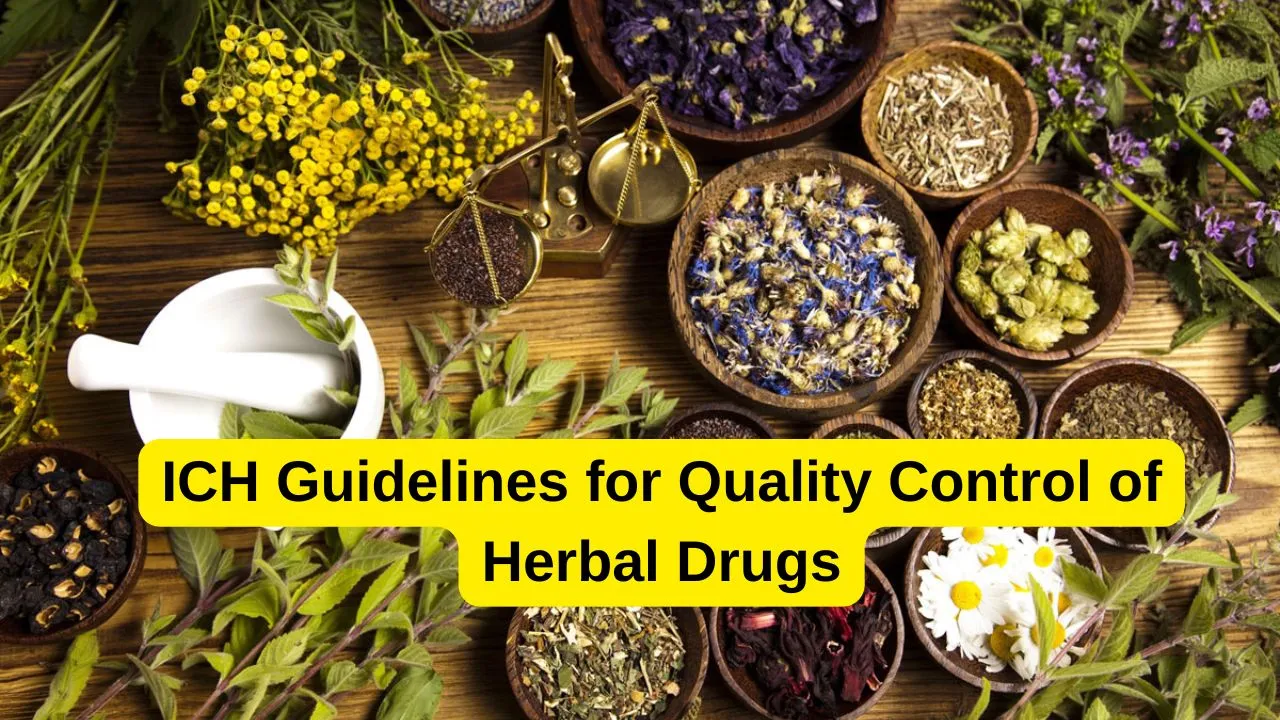Striking herbal medicines have caught the world’s attention owing to their therapeutic value and health benefits. One of the issues that still needs dealing with is the quality assurance, safety, and efficacy of herbal products. Numerous national bodies and international institutions have made specific guidelines to tackle these issues. On a global scale, quality control in herbal drugs is becoming more unified with the International Council for Harmonisation of Technical Requirements for Pharmaceuticals for Human Use (ICH) having a primary influence. Even though ICH was originally designed for synthetic pharmaceuticals, its principles are now being used extensively in herbal medicine.
Importance of Quality Control in Herbal Drugs
Quality control is the heart and soul of guaranteeing that herbal medicines meet safety, effectiveness, and consistency standards. Synergistic herbal products are intricately complex mixtures of diverse plant species with bioactive compounds that come from different geographical origins together with varying cultivation and extraction techniques, all of which have a bearing on final product use. Unlike synthetic drugs, variability in raw materials will invariably transcend the set standard. Therefore, stringent quality control ensures the herbal product’s authenticity, purity, potency together with the absence of contaminants such as heavy metals, pesticides, microbial toxins, and other potential hazardous substances.
Summary of ICH Guidelines Pertaining to Herbal Drugs
The ICH guidelines include multiple areas of interest that can be applied to the herbal drug’s quality control:
- ICH Q6A: Specifications—Test Procedures and Acceptance Criteria for New Drug Substances and New Drug Products:
This guideline describes how to formulate specifications for drug products and drug substances. In the case of herbal drugs, it stresses the importance of setting in particular identity verification, assay procedures, and limits of impurities. Herbal medicines need to be monitored based on standards of characterization which requires their detailed characterization through chromatographic techniques such as HPLC or TLC.
- ICH Q7: Good Manufacturing Practice (GMP) for Active Pharmaceutical Ingredients:
While these are meant for synthetic APIs, ICH Q7’s GMP principles are fundamental to herbal drug manufacturing. It underscores the importance of requisite complete records, quality control and assurance systems, control over starting materials, validation of processes to reduce pollution, and conformity to standards for the uniformity of the product.]
- ICH Q8 (Pharmaceutical Development):
This guideline supports a product and process understanding framework. To herbal drugs, it means analyzing the variability in raw plant materials, the methods of extraction, and the stability of active components form the constituents to improve formulation and process design parameters.
- ICH Q9 (Quality Risk Management):
The ICH Q9 framework helps to identify, assess and control risks regarding a drug’s quality. For herbal drugs, risk management is particularly vital due to the variability of natural materials. This helps in identifying quality issues as well as resolving them throughout the product’s lifecycle.
- ICH Q10 (Pharmaceutical Quality System):
Developing and maintaining an effective quality system as outlined in ICH Q10 promotes sustained improvement and proactive quality management. This can be translated to the herbal drug industry to ensure products of algorithmically defined quality.
Difficulty in Implementing ICH Guidelines for Herbal Drugs
The most difficult herbal drugs to manage include those consisting of complex mixtures alongside raw materials with uncontrolled variability, as well as the absence of a standardized reference substance. In any case, the ICH guidelines promote the application of sophisticated analytical techniques, risk-based strategies, and stringent GMP compliance to address these challenges. Furthermore, the application of traditional wisdom with scientific methods could improve the quality control system.
The use of ICH guidelines on herbal drugs is an important step in the unification of quality control standards internationaly. With these principles incorporated, manufacturers will guarantee the safety, effectiveness, and reliability of herbal medicines which in turn helps consumers trust the products and makes it easier to get regulatory approvals. It is important that holistic health professionals, scientists, and regulators continue to work together to improve these guidelines and enhance the global herbal drug industry.

